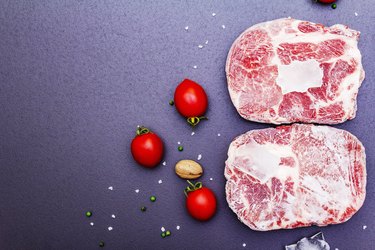
It can be hard not to get bummed out if you've finally made up your mind to cook the steak that's been lying in your freezer for months, only to find that it has freezer burns. Here's what you need to know about freezer-burned meat and whether that freezer-burned steak is safe to consume.
Tip
Freezer-burned meat is safe to consume; however, it may have deteriorated in quality.
Video of the Day
Read more: How Do I Know When Salmon Has Gone Bad?
Video of the Day
What Is Freezer Burn?
Penn State Extension explains the science of freezing and how it results in freezer-burned steak. It happens because food and water freeze at different rates. When you put food in the freezer, its water content usually freezes first, forming ice crystals.
Opening and closing the freezer door can cause the food to thaw slightly and then freeze again. This freeze-thaw cycle allows the ice crystals to grow. As they grow, they damage the parts of the food that they are in contact with. Frost-free freezers also have freeze-thaw cycles that enable this process.
Apart from crystal growth, food also gets damaged by dehydration that occurs when it is exposed to air. Contact with oxygen has a bleaching effect on the food, stripping it of color, texture, taste and aroma.
Is Freezer-Burned Meat Safe?
Penn State Extension notes that meat is more likely to get freezer-burned because it is often poorly wrapped. The USDA Food Safety and Inspection Service (USDA FSIS) explains that your freezer-burned steak is safe to consume; the freezer burns are merely dry spots that do not make the meat unsafe for consumption. The dry spots can have a grayish-brown, leathery appearance.
Apart from freezer burn, lack of oxygen or prolonged storage periods can also affect food stored in the freezer, causing it to change color. Meat may slowly lose its red color and turn brown.
Freezer-burned chicken and meat could also develop dried white patches, according to the USDA FSIS. Freezer-burned chicken and other poultry may sometimes have dark bones. In some cases of freezer-burned chicken, the meat around the bones also gets darker in color.
The USDA FSIS states that consuming freezer-burned meat won't harm you, provided you cook the meat until it reaches an internal temperature of 165 degrees Fahrenheit. Freezer burns may affect the quality of the meat and make it dried out and tasteless, so it's up to you to decide whether you want to cook it or not.
In the case of mild freezer burn, the USDA FSIS suggests trimming away those parts, either before or after you cook the meat. If the meat is heavily freezer-burned, you may have to discard it because its quality may have deteriorated significantly.
Read more: Can Old Vegetables Make You Sick?
Preventing Freezer Burn
Penn State Extension recommends these steps to prevent, or at the very least minimize, freezer burn:
- Store the meat properly: Freeze the meat in plastic bags that are specifically labelled for freezing, since regular storage bags are not vapor-proof. Squeeze the air out of the bags and seal them tightly before you freeze them. You can also use vacuum sealed bags that remove air. Wrapping the meat in freezer paper or aluminum foil can also help minimize contact with air.
- Freeze food quickly: Rapid freezing improves the quality of the meat, so freeze it as soon as you can, at the lowest temperature possible. It is recommended that you freeze it at zero degrees or lower. If you are freezing large quantities of food, set the temperature 10 F lower until the food is frozen, so that it can freeze quickly.
- Minimize freezing and thawing: Open the freezer door only when necessary. Opt for a manual defrost freezer if possible, since frost-free freezers have automatic freeze-thaw cycles.
- Don't overload the freezer: The University of Minnesota Extension notes that overloading the freezer can slow down the rate at which the food freezes and affect the quality of the meat.